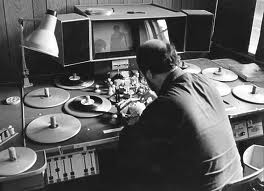Many years ago, I was working as a TV producer in a small market, producing mostly commercials and corporate films. It was my first real job as a producer, having worked before as a film editor for local news and a newswriter and finally as a news cameraman.
I had lived in Vancouver and had a small film company with my friend Phil Borsos. When I say small, I mean infinitely small. We rarely got any work. So when the job came up at a city of 125,000 I took it, even though Vancouver was bigger. My idea was to get the job as producer, stay for a year and leave for a bigger market. That was the norm and still is today.
Immediately I sensed the local crew didn't care for me, they felt someone local should have gotten the job. In time that dissipated and we all got along well. But there was something else I began to learn.The difference between the techies and the dreamers.
Or, those who are creative and those who play with circuits, diagrams and scopes.
We used 2-inch video tape machines in those days, 1976 to be accurate. The video players were the size of refrigerators and whenever we had to edit a commercial we used two or sometimes three of the huge "VTRs".
Just to understand the scale of tapes, a cassette player tape is less than a half inch. These monsters recorded on 2 inch tape. And there were no mouses to move around the screen. We would play the recorded tape and when I said stop, the tech would stop.
He'd mark it with a sharpie pen and we'd move on. In an hour we had black marks all over the tape as we recorded to another. Amazingly it worked well. Today you can do on iMovie we couldn't even imagine back then.
And that's also where conflict began to come in.
I was looking at a monitor and noticed the actor in the commercial had green tones to his face. I told the tech and he said the colors are correct. I looked at him and he was looking at the scopes on the VTR where images were in scale form, lines and charts.
At that moment I realized we weren't talking about the same thing; he saw images in the form of wavy lines, I saw them as real people. Eventually he changed the color for me, under duress. After that we never really became close friends.
Back to editing.
Ever since the beginning of movies, there were editors and they cut film into movies. That all changed in the last 20 years when editing became video-based. We still shoot with film but it's all transferred to digital video and edited there.
The big edit program is Avid, then there's Final Cut Pro, Adobe and a few others. But back in the pre-digital era the editor had a mechanical editing machine, a Moviola (that goes back to the 1930's and still works great), and then flatbed editing machines like Steenbecks and Kems.
Flatbeds were a great new thing in their day, you could roll the film forward and back and see your scene on a screen about 12 inches or so. This is how some of the greatest movies ever were edited.
Now it's pretty much gone, digital has taken over. In some ways it's better and in others it's not. But another thing is the tech part. I manage to stumble through most of it, but often need help, not for the content, but for software issues.
But digital is finicky, it's a computer and as we all know, they screw up more often than not. I spend almost as much time fixing, correcting, cursing and looking for solutions as I do actually editing.
In fact there are at least a dozen forums for Final Cut Pro and hundreds of videos on Youtube to help those of us who aren't as technical as the others seem to be. The biggest problem on a Steenbeck was a light bulb going out.
So, with all this digital stuff, are movies better? Does it help to have 28-inch monitors and dozens of slick tricks and effects and buttons? Are we more creative?
No.
Look at Citizen Kane, edited on a Moviola with a 6 inch screen and Bridge on The River Kwai (and if you haven't heard of these movies, see them).
So the argument is this; does a great movie come from technology or does it come from creativity? Tech can bring us great things, iPods, tablets, tiny cameras. But the human element is what elevates them.
In quantum physics, many of those who work in that field say that creativity is the hardest thing for technology to create, maybe impossible. That's the only thing robots can't duplicate. Show 5 people a movie, they'll have 5 different opinions.
Finally there's another element to technology, not only in film and TV but also in our everyday world.
It takes away more jobs than it creates.
Right now I'm editing 3 different short films, one for Ghostkeeper, another for Emperor of Mars and yet another for a documentary on film director Raoul Walsh. All on Final Cut Pro.
And in the process I have taken away at least 12 jobs with my iMac and FCP. I can edit, score, color and time my little projects. And with a growing population and less jobs, the next 50 years is going to be pretty interesting...
(Thurs: 10 things I've learned in 30 years)

.jpg)




No comments:
Post a Comment